2024届高考英语一般现在时课件(共36张PPT)
文档属性
| 名称 | 2024届高考英语一般现在时课件(共36张PPT) |
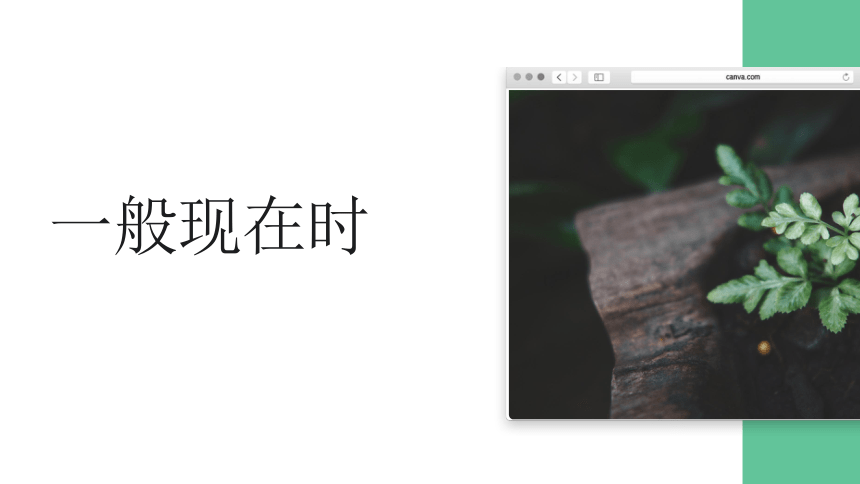
|
|
| 格式 | pptx | ||
| 文件大小 | 9.6MB | ||
| 资源类型 | 教案 | ||
| 版本资源 | 其它版本 | ||
| 科目 | 英语 | ||
| 更新时间 | 2024-04-10 00:00:00 | ||
图片预览

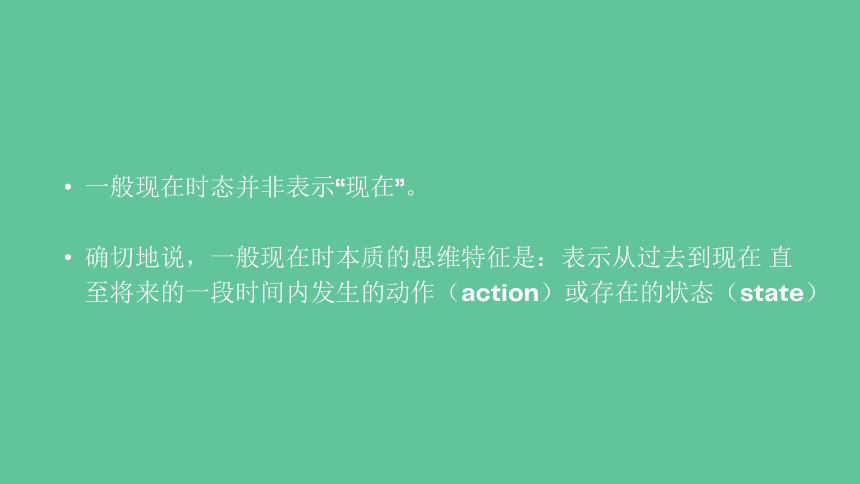


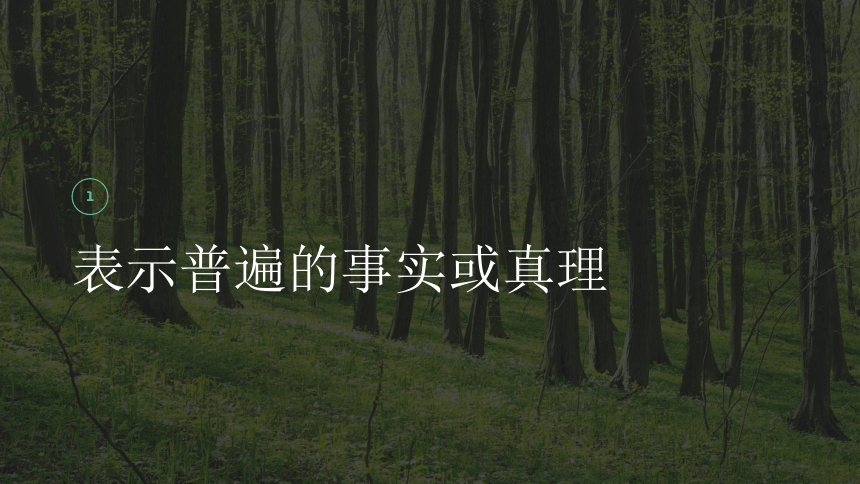
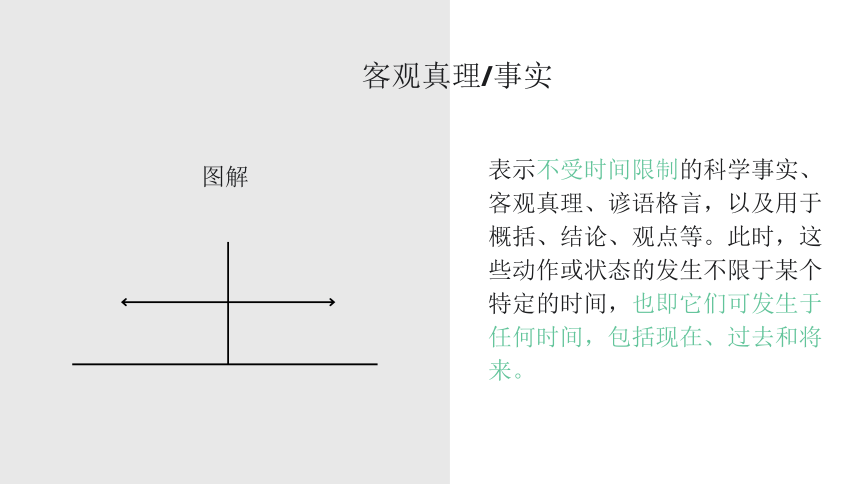
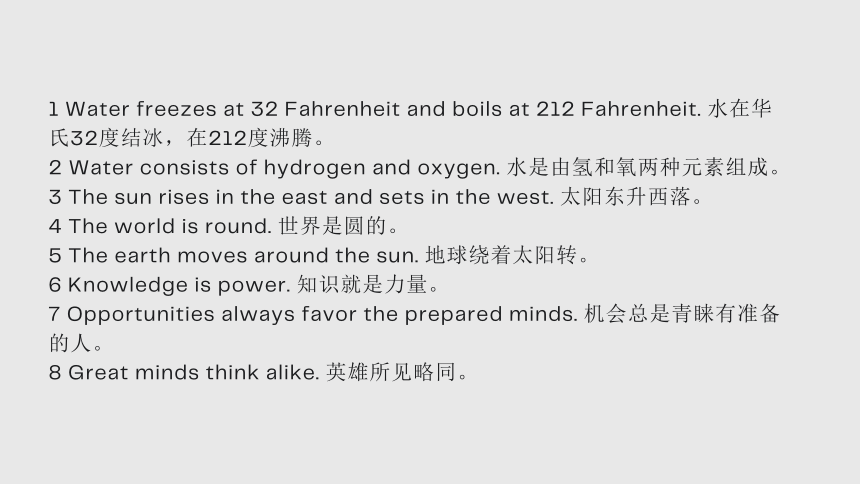
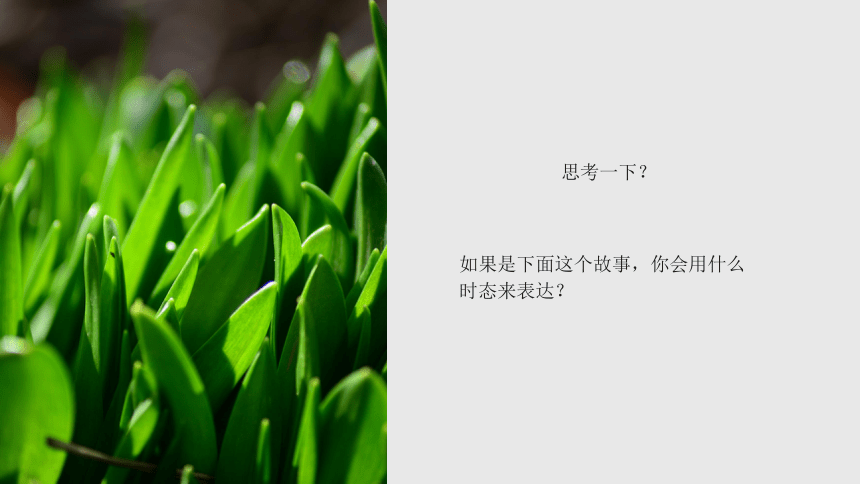
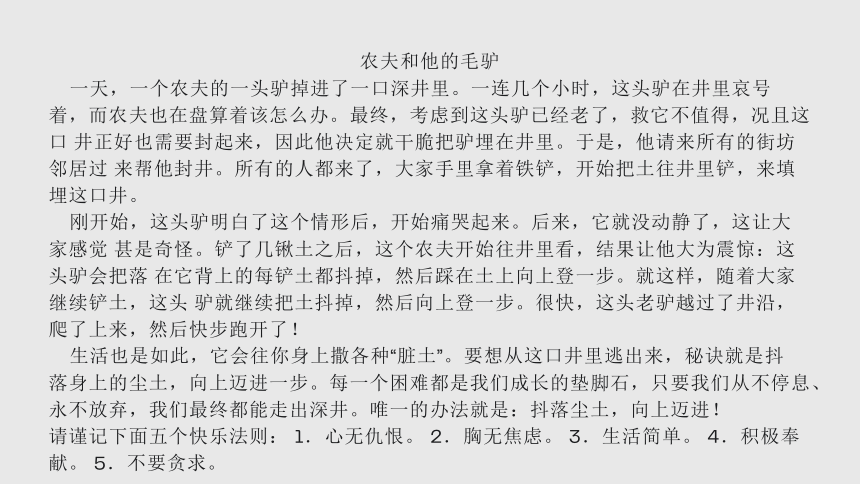
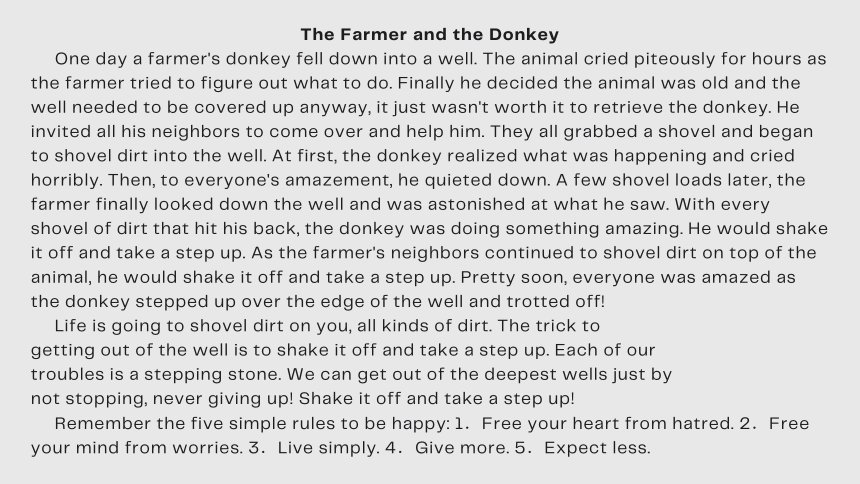
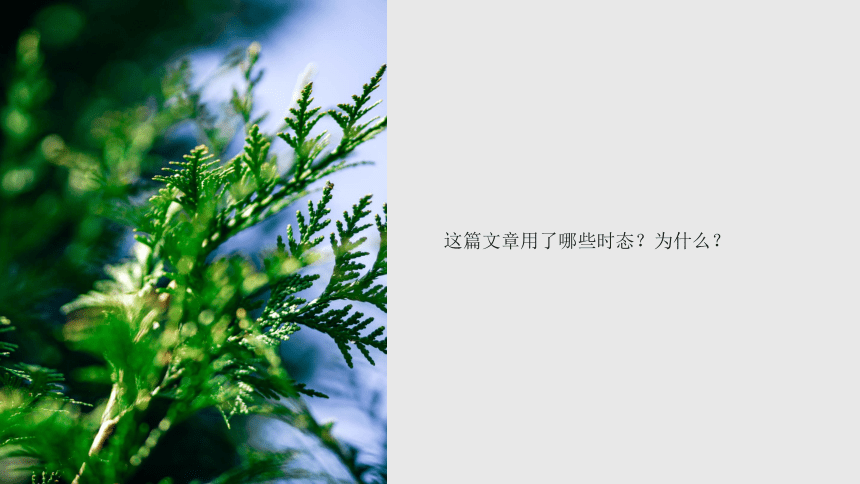
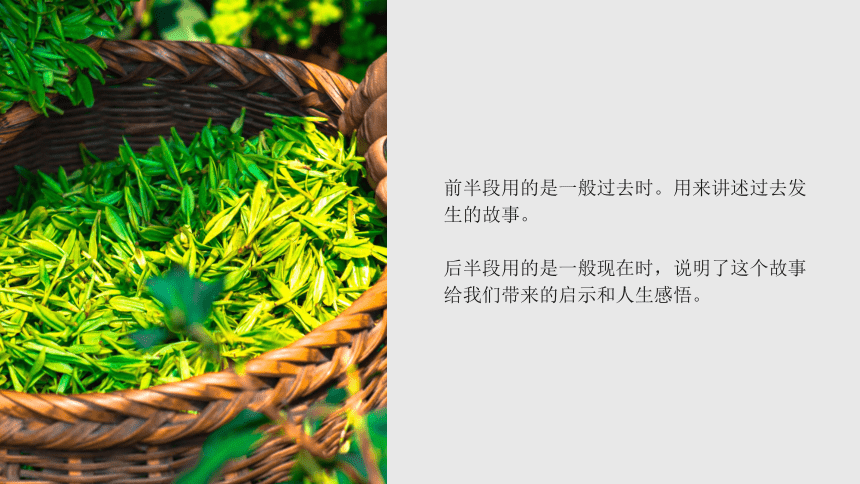
文档简介
(共36张PPT)
一般现在时
一般现在时态并非表示“现在”。
确切地说,一般现在时本质的思维特征是:表示从过去到现在 直至将来的一段时间内发生的动作(action)或存在的状态(state)
不受时间限制的科学事实、客观真理、谚语格言,以及用于概括、结论、观点等;
表示人们日常生活习惯及重复活动
因此,一般现在时态通常被描述为有两种基本用法:表示客观真理,以及表示习惯活动。具体来说:
客观真理/事实
经常性的重复活动
图解
表示普遍的事实或真理
1
客观真理/事实
表示不受时间限制的科学事实、客观真理、谚语格言,以及用于概括、结论、观点等。此时,这些动作或状态的发生不限于某个特定的时间,也即它们可发生于任何时间,包括现在、过去和将来。
图解
1 Water freezes at 32 Fahrenheit and boils at 212 Fahrenheit. 水在华
氏32度结冰,在212度沸腾。
2 Water consists of hydrogen and oxygen. 水是由氢和氧两种元素组成。
3 The sun rises in the east and sets in the west. 太阳东升西落。
4 The world is round. 世界是圆的。
5 The earth moves around the sun. 地球绕着太阳转。
6 Knowledge is power. 知识就是力量。
7 Opportunities always favor the prepared minds. 机会总是青睐有准备
的人。
8 Great minds think alike. 英雄所见略同。
思考一下?
如果是下面这个故事,你会用什么时态来表达?
农夫和他的毛驴
一天,一个农夫的一头驴掉进了一口深井里。一连几个小时,这头驴在井里哀号
着,而农夫也在盘算着该怎么办。最终,考虑到这头驴已经老了,救它不值得,况且这口 井正好也需要封起来,因此他决定就干脆把驴埋在井里。于是,他请来所有的街坊邻居过 来帮他封井。所有的人都来了,大家手里拿着铁铲,开始把土往井里铲,来填埋这口井。
刚开始,这头驴明白了这个情形后,开始痛哭起来。后来,它就没动静了,这让大家感觉 甚是奇怪。铲了几锹土之后,这个农夫开始往井里看,结果让他大为震惊:这头驴会把落 在它背上的每铲土都抖掉,然后踩在土上向上登一步。就这样,随着大家继续铲土,这头 驴就继续把土抖掉,然后向上登一步。很快,这头老驴越过了井沿,爬了上来,然后快步跑开了!
生活也是如此,它会往你身上撒各种“脏土”。要想从这口井里逃出来,秘诀就是抖
落身上的尘土,向上迈进一步。每一个困难都是我们成长的垫脚石,只要我们从不停息、 永不放弃,我们最终都能走出深井。唯一的办法就是:抖落尘土,向上迈进!
请谨记下面五个快乐法则: 1.心无仇恨。 2.胸无焦虑。 3.生活简单。 4.积极奉献。 5.不要贪求。
The Farmer and the Donkey
One day a farmer's donkey fell down into a well. The animal cried piteously for hours as the farmer tried to figure out what to do. Finally he decided the animal was old and the well needed to be covered up anyway, it just wasn't worth it to retrieve the donkey. He invited all his neighbors to come over and help him. They all grabbed a shovel and began to shovel dirt into the well. At first, the donkey realized what was happening and cried horribly. Then, to everyone's amazement, he quieted down. A few shovel loads later, the farmer finally looked down the well and was astonished at what he saw. With every shovel of dirt that hit his back, the donkey was doing something amazing. He would shake it off and take a step up. As the farmer's neighbors continued to shovel dirt on top of the animal, he would shake it off and take a step up. Pretty soon, everyone was amazed as the donkey stepped up over the edge of the well and trotted off!
Life is going to shovel dirt on you, all kinds of dirt. The trick to
getting out of the well is to shake it off and take a step up. Each of our
troubles is a stepping stone. We can get out of the deepest wells just by
not stopping, never giving up! Shake it off and take a step up!
Remember the five simple rules to be happy: 1.Free your heart from hatred. 2.Free your mind from worries. 3.Live simply. 4.Give more. 5.Expect less.
这篇文章用了哪些时态?为什么?
前半段用的是一般过去时。用来讲述过去发生的故事。
后半段用的是一般现在时,说明了这个故事给我们带来的启示和人生感悟。
表示重复活动
2
经常性的重复活动
图解
表示经常发生的、习惯性的动作(action)或者是存在的状态
(state)
1 He often goes to the gym. 他经常去健身房。
2 I go to the gym twice a week. 我每周去两次健身房。
3 He walks to school every day. 他每天步行去上学。
表示习惯的动作
表示习惯的动作
I like rice for dinner. 我晚餐喜欢吃米饭。
这一用法常和一些表示动作频率的时间副词连用
always,frequently,usually,
sometimes,generally,occasionally和often
never,seldom和rarely
once a week,twice a year和on alternate days
1. He is always late. 他总是迟到。
2.He always goes to school by bike. 他总是骑自行车上学。
3.He seldom comes late. 他几乎从不迟到。
4.The history lectures sometimes aren't interesting.关于历史的讲座有时很没意思。
5.His wife complains that he sometimes doesn't listen to her. 他的妻子抱怨,说他有时候不注意听她说话。
6.He doesn't always leave before 6 o'clock. Sometimes he works until 7 o'clock.他并不总是在6点钟下班,有时他会工作到7点。
7.Brush your teeth at least twice a day.
8.Replace the toothbrush every 3 to 4 months.
9.Floss your teeth once a day.
10.Clean your tongue at least once a day.
11.Visit your dentist once in every 6 months.
一般现在时的其他用法
3
1. 一般现在时表示正在发生的动作
2.一般现在时表示将来发生的动作
3.一般现在时表示过去发生的动作
4.一般现在时代指现在完成时
1. 一般现在时表示正在发生的动作
2.一般现在时表示将来发生的动作
3.一般现在时表示过去发生的动作
4.一般现在时代指现在完成时
1 Here comes your wife.
2 There goes our bus; we'll have to wait for the next one.
1.一般现在时态用在以there或here开头的句子中
2.表示现在瞬间的动作
这个瞬间动作是说话人在说话的同时即刻发生的。这只适用于表达动作的动词,表示对一些动作的解说,比如:球赛解说、剧情介绍、解释自己正在做的事情、给别人一边说一边做的示范动作等等。
1 Michael passes to Clint. Clint to Jack, Jack back to Clint—and
Clint shoots—and it's a goal! (解说)
2 The woman is a spy, now she enters the room, opens the drawer, takes out a pistol and slips it into her pocket. (剧情介绍)
3 I select an album, remove the record from its cover and put it on the turn table. (解释自己正在做的事情)
4 Watch carefully. First I pick up the receiver, dial the number I
want, then drop the coin into the slot as required. (教别人)
1. 一般现在时表示正在发生的动作
2.一般现在时表示将来发生的动作
3.一般现在时表示过去发生的动作
4.一般现在时代指现在完成时
1 Please let me know when he comes back. 他回来时请告诉我。
2 What are you going to do when you leave school 你毕业以后想要干 些什么?
3 I'll be glad if she comes over to visit me. 如果她来看我,我会很高兴。
4 I'll give the book to him as soon as I see him. 我一见到他就会把书给他。
5 I will get everything ready before you come back. 你回来之前我会把所有的东西都准备好。
1.用在条件状语从句和时间状语从句中
上述从句中的动作come和see均是将在未来发生的,但要用一般
现在时表示将来。不过若从句的动作含有“意愿”的意思,则从句中可
用will。
6 If you will give me a hand with these books, I'll appreciate it. 如果你愿意帮我拿这些书,我将非常感激。
7 If they will not accept a check, we shall have to pay in cash,
though it would be much trouble for both sides.
要是他们不愿意接受支票,我们就只好用现金支付,尽管这样会给双方带来不便。
8 If you will continue to fight, the victory will certainly be yours. 要是你们愿意继续斗争下去,就一定会取得胜利。
1 I will reward the person who finds my lost kitten. 我将酬谢找到我 的猫的人。 (定语从句)
2 I will give the booklet to whoever asks for it. 谁来索取这个小册子,我就把它给谁。 (宾语从句)
3.在从句中表示将来的动作,此时主句往往用了一个将来时
1. 一般现在时表示正在发生的动作
2.一般现在时表示将来发生的动作
3.一般现在时表示过去发生的动作
4.一般现在时代指现在完成时
1 Please let me know when he comes back. 他回来时请告诉我。
2 What are you going to do when you leave school 你毕业以后想要干 些什么?
3 I'll be glad if she comes over to visit me. 如果她来看我,我会很高兴。
4 I'll give the book to him as soon as I see him. 我一见到他就会把书给他。
5 I will get everything ready before you come back. 你回来之前我会把所有的东西都准备好。
1.表示死者的理论、著作等
The newspaper reads, "The criminal who killed eight women has been executed."
The sign on the washing machine says, "Out of Order."
2. 引用书刊、报纸、通知或新近收到的信件的内容时
1. 一般现在时表示正在发生的动作
2.一般现在时表示将来发生的动作
3.一般现在时表示过去发生的动作
4.一般现在时代指现在完成时
1 I am (=have been) informed that you have been there. 有人告
2 I hear (=have heard) that he has left Beijing.
3 I hear (=have heard) you're getting married.
4 I hear (=have heard) you've been busy lately.
5 I see/find (=have seen/found) that you have you hair cut. You
look terrific!
6 I read (=have read) in the newspaper that the criminal who
killed eight women has been executed.
在口语中,可以用一般现在时代指现在完成时。能这样使用的动 词不多,通常有:hear,find,see,learn,tell和read等等。
Exercise
1.Vegetarians______(not, eat) meat.
2.An atheist______(not, believe) in God.
3.Constant dripping______(wear) away a stone.
4.I______(go) to the gym every five days.
5.I______(go) to the gym every five days, but I think I'll make it
every other day later.
6.A: I______(run) a mile every afternoon for the past month, but I still haven't been able to lose more than a pound or two. I wonder if it's worth it.
B: Oh, don't give up now. It always______(seem) hard when you are just starting out.
8.The stock market______(rise) and______(fall) as its internal
feature.
9.John______(always, not, go) to school late. That is to say,
he______(sometimes, attend) school late. He (be, generally) a good student. He______(be, always) ready to help others.
10.I______(get) up at seven o'clock every morning.
11.I______(get) up at seven o'clock every morning, but I think I'll get up earlier from now on.
12.He______(often, go) to movies with Nancy on weekends.
13.You______(go) with Nancy for over three years now. Why don't you pop her the question
14.If it______(rain) tomorrow, we'll have to put off our sports
meet.
15.The front page of a newspaper______(contain) the most
important news of the day.
16.The mother______(often, take) her son to school before
she______(go) to work.
17.Watch carefully. First I______(pick) up the receiver,
______(dial) the number I______(want), then______(drop) the coin into the slot as required.
18.Darwin______(originate) the theory of evolution and______(differ) from the Bible on the creation of the world.
19.Look! Here______(come) your boyfriend!
20.A: Look! It______(snow).
B: It's wonderful! It______(snow, not) in my hometown.
21.A: When ______ you ______ (often, get) up in the morning
B: I______(usually, wake) up at 6:30 and then______(stay) in bed
until 7:00 o'clock.
A: Then what
B: Then I______(put) on my clothes. I______(eat) breakfast.
A:______you______(always, eat) breakfast
B: Yes,______. I think that's good for your health.
A: What______you______(often, have) for breakfast
B: Bread and some milk.
一般现在时
一般现在时态并非表示“现在”。
确切地说,一般现在时本质的思维特征是:表示从过去到现在 直至将来的一段时间内发生的动作(action)或存在的状态(state)
不受时间限制的科学事实、客观真理、谚语格言,以及用于概括、结论、观点等;
表示人们日常生活习惯及重复活动
因此,一般现在时态通常被描述为有两种基本用法:表示客观真理,以及表示习惯活动。具体来说:
客观真理/事实
经常性的重复活动
图解
表示普遍的事实或真理
1
客观真理/事实
表示不受时间限制的科学事实、客观真理、谚语格言,以及用于概括、结论、观点等。此时,这些动作或状态的发生不限于某个特定的时间,也即它们可发生于任何时间,包括现在、过去和将来。
图解
1 Water freezes at 32 Fahrenheit and boils at 212 Fahrenheit. 水在华
氏32度结冰,在212度沸腾。
2 Water consists of hydrogen and oxygen. 水是由氢和氧两种元素组成。
3 The sun rises in the east and sets in the west. 太阳东升西落。
4 The world is round. 世界是圆的。
5 The earth moves around the sun. 地球绕着太阳转。
6 Knowledge is power. 知识就是力量。
7 Opportunities always favor the prepared minds. 机会总是青睐有准备
的人。
8 Great minds think alike. 英雄所见略同。
思考一下?
如果是下面这个故事,你会用什么时态来表达?
农夫和他的毛驴
一天,一个农夫的一头驴掉进了一口深井里。一连几个小时,这头驴在井里哀号
着,而农夫也在盘算着该怎么办。最终,考虑到这头驴已经老了,救它不值得,况且这口 井正好也需要封起来,因此他决定就干脆把驴埋在井里。于是,他请来所有的街坊邻居过 来帮他封井。所有的人都来了,大家手里拿着铁铲,开始把土往井里铲,来填埋这口井。
刚开始,这头驴明白了这个情形后,开始痛哭起来。后来,它就没动静了,这让大家感觉 甚是奇怪。铲了几锹土之后,这个农夫开始往井里看,结果让他大为震惊:这头驴会把落 在它背上的每铲土都抖掉,然后踩在土上向上登一步。就这样,随着大家继续铲土,这头 驴就继续把土抖掉,然后向上登一步。很快,这头老驴越过了井沿,爬了上来,然后快步跑开了!
生活也是如此,它会往你身上撒各种“脏土”。要想从这口井里逃出来,秘诀就是抖
落身上的尘土,向上迈进一步。每一个困难都是我们成长的垫脚石,只要我们从不停息、 永不放弃,我们最终都能走出深井。唯一的办法就是:抖落尘土,向上迈进!
请谨记下面五个快乐法则: 1.心无仇恨。 2.胸无焦虑。 3.生活简单。 4.积极奉献。 5.不要贪求。
The Farmer and the Donkey
One day a farmer's donkey fell down into a well. The animal cried piteously for hours as the farmer tried to figure out what to do. Finally he decided the animal was old and the well needed to be covered up anyway, it just wasn't worth it to retrieve the donkey. He invited all his neighbors to come over and help him. They all grabbed a shovel and began to shovel dirt into the well. At first, the donkey realized what was happening and cried horribly. Then, to everyone's amazement, he quieted down. A few shovel loads later, the farmer finally looked down the well and was astonished at what he saw. With every shovel of dirt that hit his back, the donkey was doing something amazing. He would shake it off and take a step up. As the farmer's neighbors continued to shovel dirt on top of the animal, he would shake it off and take a step up. Pretty soon, everyone was amazed as the donkey stepped up over the edge of the well and trotted off!
Life is going to shovel dirt on you, all kinds of dirt. The trick to
getting out of the well is to shake it off and take a step up. Each of our
troubles is a stepping stone. We can get out of the deepest wells just by
not stopping, never giving up! Shake it off and take a step up!
Remember the five simple rules to be happy: 1.Free your heart from hatred. 2.Free your mind from worries. 3.Live simply. 4.Give more. 5.Expect less.
这篇文章用了哪些时态?为什么?
前半段用的是一般过去时。用来讲述过去发生的故事。
后半段用的是一般现在时,说明了这个故事给我们带来的启示和人生感悟。
表示重复活动
2
经常性的重复活动
图解
表示经常发生的、习惯性的动作(action)或者是存在的状态
(state)
1 He often goes to the gym. 他经常去健身房。
2 I go to the gym twice a week. 我每周去两次健身房。
3 He walks to school every day. 他每天步行去上学。
表示习惯的动作
表示习惯的动作
I like rice for dinner. 我晚餐喜欢吃米饭。
这一用法常和一些表示动作频率的时间副词连用
always,frequently,usually,
sometimes,generally,occasionally和often
never,seldom和rarely
once a week,twice a year和on alternate days
1. He is always late. 他总是迟到。
2.He always goes to school by bike. 他总是骑自行车上学。
3.He seldom comes late. 他几乎从不迟到。
4.The history lectures sometimes aren't interesting.关于历史的讲座有时很没意思。
5.His wife complains that he sometimes doesn't listen to her. 他的妻子抱怨,说他有时候不注意听她说话。
6.He doesn't always leave before 6 o'clock. Sometimes he works until 7 o'clock.他并不总是在6点钟下班,有时他会工作到7点。
7.Brush your teeth at least twice a day.
8.Replace the toothbrush every 3 to 4 months.
9.Floss your teeth once a day.
10.Clean your tongue at least once a day.
11.Visit your dentist once in every 6 months.
一般现在时的其他用法
3
1. 一般现在时表示正在发生的动作
2.一般现在时表示将来发生的动作
3.一般现在时表示过去发生的动作
4.一般现在时代指现在完成时
1. 一般现在时表示正在发生的动作
2.一般现在时表示将来发生的动作
3.一般现在时表示过去发生的动作
4.一般现在时代指现在完成时
1 Here comes your wife.
2 There goes our bus; we'll have to wait for the next one.
1.一般现在时态用在以there或here开头的句子中
2.表示现在瞬间的动作
这个瞬间动作是说话人在说话的同时即刻发生的。这只适用于表达动作的动词,表示对一些动作的解说,比如:球赛解说、剧情介绍、解释自己正在做的事情、给别人一边说一边做的示范动作等等。
1 Michael passes to Clint. Clint to Jack, Jack back to Clint—and
Clint shoots—and it's a goal! (解说)
2 The woman is a spy, now she enters the room, opens the drawer, takes out a pistol and slips it into her pocket. (剧情介绍)
3 I select an album, remove the record from its cover and put it on the turn table. (解释自己正在做的事情)
4 Watch carefully. First I pick up the receiver, dial the number I
want, then drop the coin into the slot as required. (教别人)
1. 一般现在时表示正在发生的动作
2.一般现在时表示将来发生的动作
3.一般现在时表示过去发生的动作
4.一般现在时代指现在完成时
1 Please let me know when he comes back. 他回来时请告诉我。
2 What are you going to do when you leave school 你毕业以后想要干 些什么?
3 I'll be glad if she comes over to visit me. 如果她来看我,我会很高兴。
4 I'll give the book to him as soon as I see him. 我一见到他就会把书给他。
5 I will get everything ready before you come back. 你回来之前我会把所有的东西都准备好。
1.用在条件状语从句和时间状语从句中
上述从句中的动作come和see均是将在未来发生的,但要用一般
现在时表示将来。不过若从句的动作含有“意愿”的意思,则从句中可
用will。
6 If you will give me a hand with these books, I'll appreciate it. 如果你愿意帮我拿这些书,我将非常感激。
7 If they will not accept a check, we shall have to pay in cash,
though it would be much trouble for both sides.
要是他们不愿意接受支票,我们就只好用现金支付,尽管这样会给双方带来不便。
8 If you will continue to fight, the victory will certainly be yours. 要是你们愿意继续斗争下去,就一定会取得胜利。
1 I will reward the person who finds my lost kitten. 我将酬谢找到我 的猫的人。 (定语从句)
2 I will give the booklet to whoever asks for it. 谁来索取这个小册子,我就把它给谁。 (宾语从句)
3.在从句中表示将来的动作,此时主句往往用了一个将来时
1. 一般现在时表示正在发生的动作
2.一般现在时表示将来发生的动作
3.一般现在时表示过去发生的动作
4.一般现在时代指现在完成时
1 Please let me know when he comes back. 他回来时请告诉我。
2 What are you going to do when you leave school 你毕业以后想要干 些什么?
3 I'll be glad if she comes over to visit me. 如果她来看我,我会很高兴。
4 I'll give the book to him as soon as I see him. 我一见到他就会把书给他。
5 I will get everything ready before you come back. 你回来之前我会把所有的东西都准备好。
1.表示死者的理论、著作等
The newspaper reads, "The criminal who killed eight women has been executed."
The sign on the washing machine says, "Out of Order."
2. 引用书刊、报纸、通知或新近收到的信件的内容时
1. 一般现在时表示正在发生的动作
2.一般现在时表示将来发生的动作
3.一般现在时表示过去发生的动作
4.一般现在时代指现在完成时
1 I am (=have been) informed that you have been there. 有人告
2 I hear (=have heard) that he has left Beijing.
3 I hear (=have heard) you're getting married.
4 I hear (=have heard) you've been busy lately.
5 I see/find (=have seen/found) that you have you hair cut. You
look terrific!
6 I read (=have read) in the newspaper that the criminal who
killed eight women has been executed.
在口语中,可以用一般现在时代指现在完成时。能这样使用的动 词不多,通常有:hear,find,see,learn,tell和read等等。
Exercise
1.Vegetarians______(not, eat) meat.
2.An atheist______(not, believe) in God.
3.Constant dripping______(wear) away a stone.
4.I______(go) to the gym every five days.
5.I______(go) to the gym every five days, but I think I'll make it
every other day later.
6.A: I______(run) a mile every afternoon for the past month, but I still haven't been able to lose more than a pound or two. I wonder if it's worth it.
B: Oh, don't give up now. It always______(seem) hard when you are just starting out.
8.The stock market______(rise) and______(fall) as its internal
feature.
9.John______(always, not, go) to school late. That is to say,
he______(sometimes, attend) school late. He (be, generally) a good student. He______(be, always) ready to help others.
10.I______(get) up at seven o'clock every morning.
11.I______(get) up at seven o'clock every morning, but I think I'll get up earlier from now on.
12.He______(often, go) to movies with Nancy on weekends.
13.You______(go) with Nancy for over three years now. Why don't you pop her the question
14.If it______(rain) tomorrow, we'll have to put off our sports
meet.
15.The front page of a newspaper______(contain) the most
important news of the day.
16.The mother______(often, take) her son to school before
she______(go) to work.
17.Watch carefully. First I______(pick) up the receiver,
______(dial) the number I______(want), then______(drop) the coin into the slot as required.
18.Darwin______(originate) the theory of evolution and______(differ) from the Bible on the creation of the world.
19.Look! Here______(come) your boyfriend!
20.A: Look! It______(snow).
B: It's wonderful! It______(snow, not) in my hometown.
21.A: When ______ you ______ (often, get) up in the morning
B: I______(usually, wake) up at 6:30 and then______(stay) in bed
until 7:00 o'clock.
A: Then what
B: Then I______(put) on my clothes. I______(eat) breakfast.
A:______you______(always, eat) breakfast
B: Yes,______. I think that's good for your health.
A: What______you______(often, have) for breakfast
B: Bread and some milk.
同课章节目录
- 名词
- 动词/动词短语
- 一般现在时及其被动式
- 一般过去时及其被动式
- 现在进行时及其被动式
- 过去进行时及其被动式
- 将来进行时及其被动式
- 现在完成时及其被动式
- 过去完成时及其被动式
- 一般将来时及其被动式
- 过去将来时及其被动式
- 现在完成进行时及其被动式
- 将来完成时及其被动式
- 副词
- 介词/介词短语
- 连词/连接词
- 数词/量词
- 冠词
- 形容词
- 非谓语动词
- 句型
- 简单句与并列句
- 复合句
- 主谓一致
- 倒装与省略
- 强调句
- 虚拟语气
- 插入语
- 固定句型
- 祈使句/感叹句
- 疑问句/反义疑问句
- 非限制性定语从句
- 句型转换
- 定语从句
- 表语从句
- 宾语从句
- 主语从句
- 动词时态与语态
- 虚拟语气与情态动词
- 主谓一致
- 独立主格结构、with的复合结构
- 情态动词
- 状语从句
- 定语从句
- 特殊句式
- 交际用语
- 代词/不定代词
- 名词性从句
- 同位语从句
- 表语从句
- 宾语从句
- 主语从句
- 直接引语和间接引语
- 构词法(word formation)
